If you want to know what are hog maws, these bad boys are basically the stomach of the pig. If you grew up like I did, you might remember your grandma or your aunties talking about how hog maws were necessary in the South every New Year’s Day. Old school Mississippi folks eat these along with chitlins like they are going out of style boos. Here, I make them the classic way by adding a ton of flavor to the pot and letting them braise until they get tender.
This post may contain affiliate links. Read our disclosure policy.
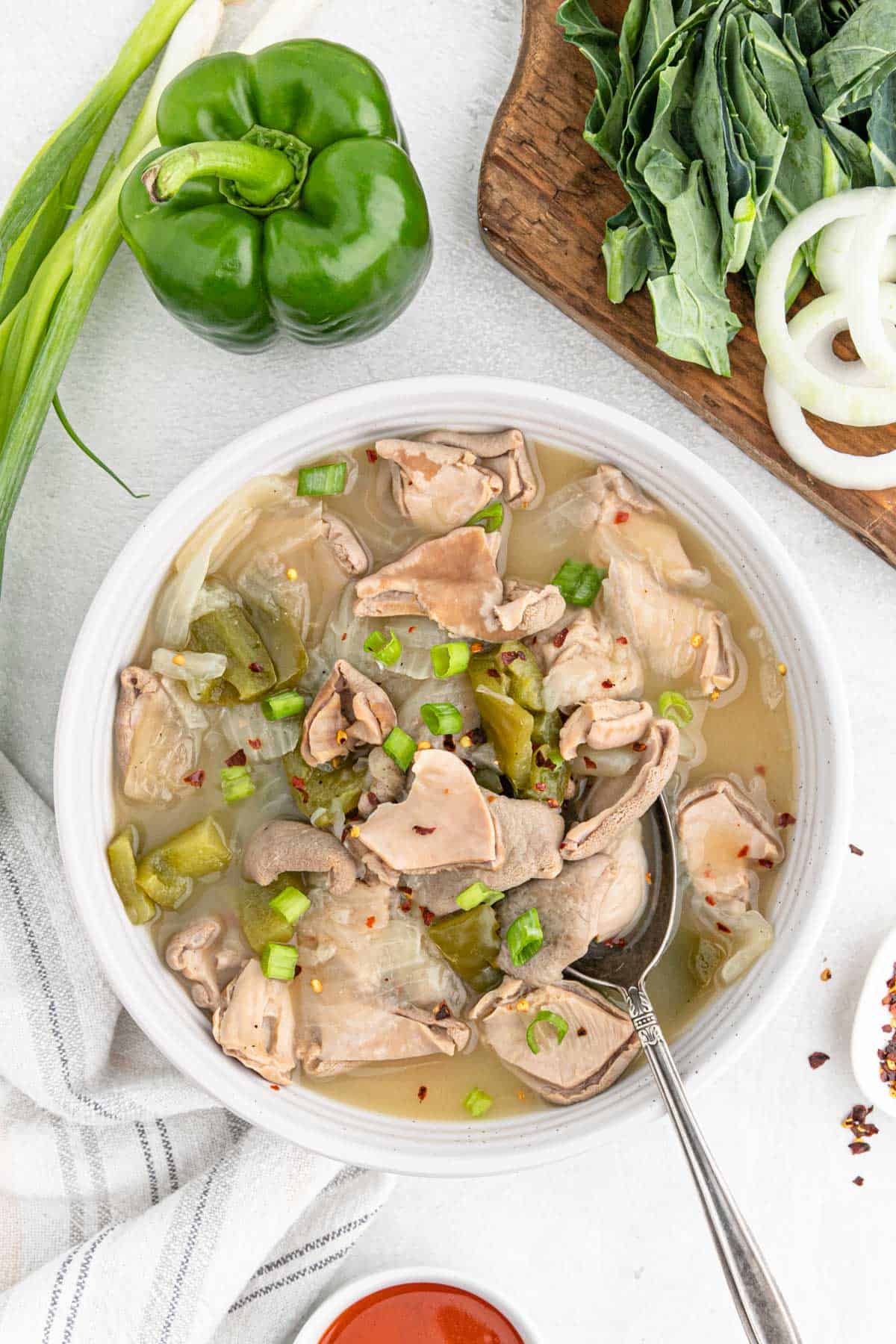
How to make Hog Maws
Cleaning the Hog Maws:
- Prepare a double sink or two separate wash sinks for the cleaning process. Start by rinsing the hog maws one by one under room temperature water to remove any excess debris. Carefully inspect each hog maw and remove any visible grit or black substances, then move to the other sink.
- Repeat the rinsing process 2 or 3 more times, ensuring they are clean and free from any impurities. Once they are clean, set them aside.
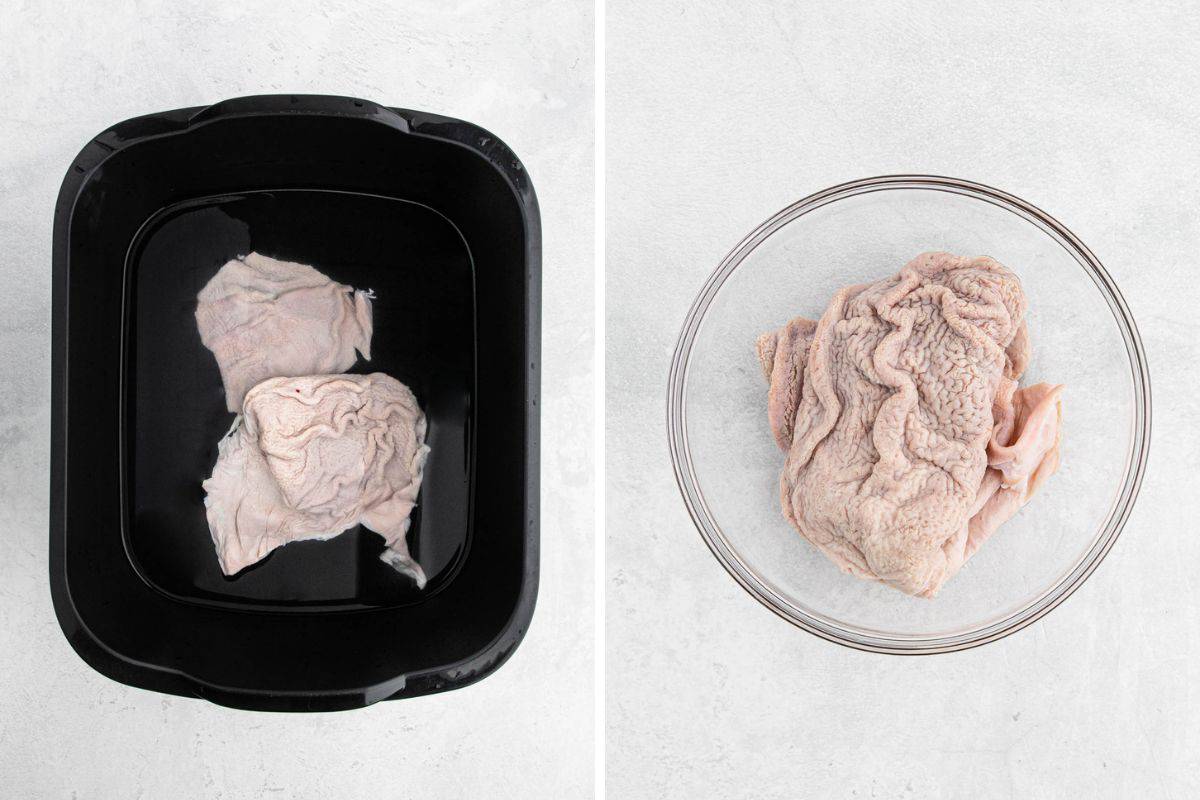
Cooking the Hog Maws:
- In a very large pot, fill it with water, then add the onion and green pepper along with salt, garlic powder, black pepper, and red pepper flakes or apple cider vinegar if using.
- Mix the ingredients, turn heat to high and bring to a rapid boil.
- Once boiling, turn heat to medium and add the cleaned hog maws one at a time to the pot. Stir gently to distribute the seasonings evenly.
- Cover the pot and cook the hog maws over medium heat until they are very tender and the flavor of the remaining liquid should be concentrated. Occasionally check the pot to check on them.
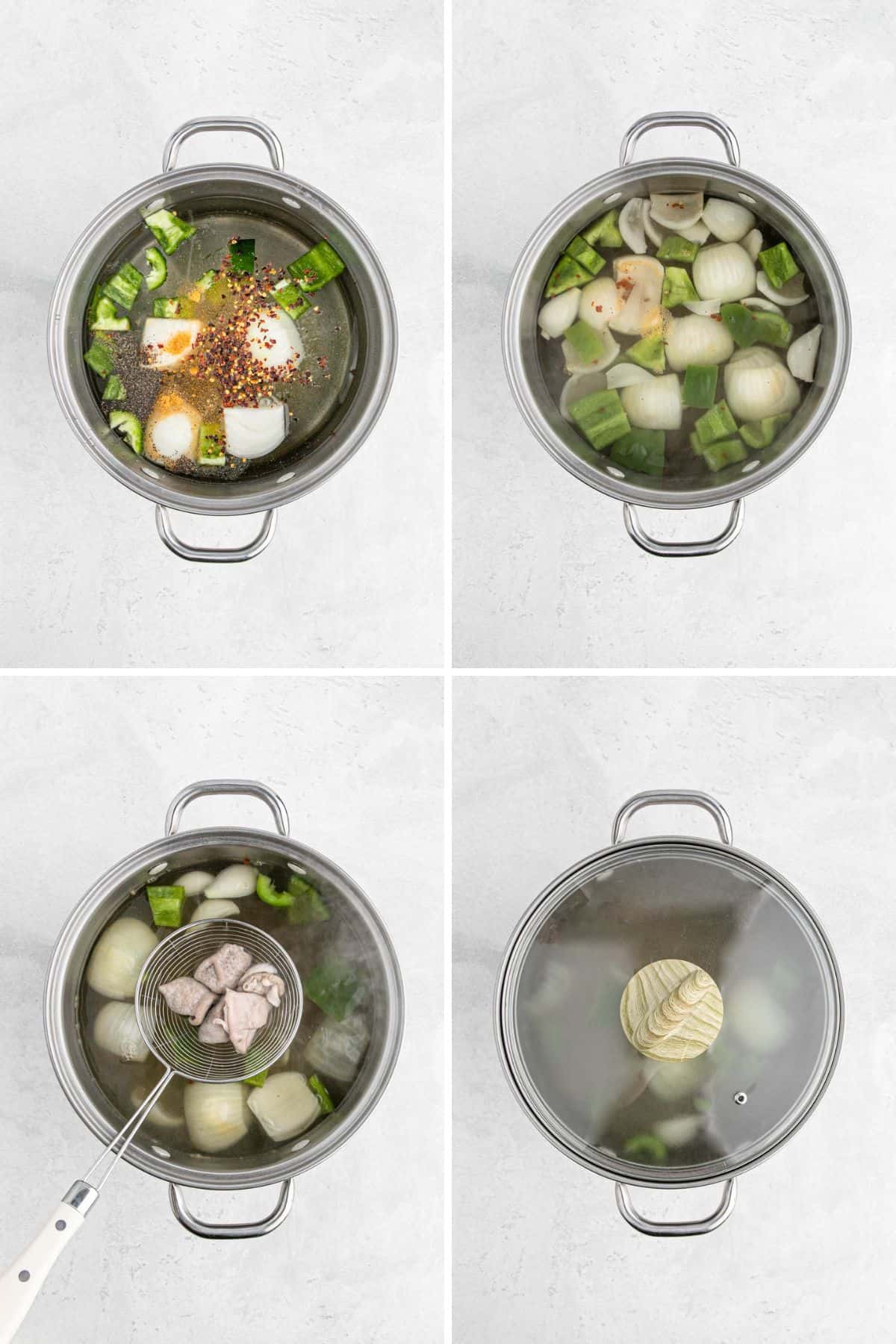
Recipe Tips
- Use the Double Sink Method: When cleaning hog maws, this method is a game-changer for keeping your prep area together. First, rinse in one sink to remove the initial dirt, then move to the second for a thorough cleanse.
- Texture Test: Around the 2-hour mark, give a poke to the hog maws with a fork to check for tenderness. They should be tender but not falling apart and mushy.
- Skim the Broth: After cooking, you’ll notice the remaining liquid is concentrated in flavor. This is a good time to skim off any excess fat from the top.
- Check the Water Level Occasionally: During the 2-3 hours of cooking, if the water is reducing too quickly, you might want to add more to prevent them from drying out or sticking to the bottom.
- Let Them Rest After Cooking: Once they are tender, let them rest for a few minutes before serving. This allows the flavors to meld further.
Serving Suggestions
- Cornbread: These are great served up with classic Southern cornbread, honey cornbread or for something easier, hot water cornbread.
- Greens: Whether you wanna serve these up with collard greens, mustard greens or turnip greens, they go together perfectly.
- Other Southern Sides: Make a pot of butter beans, Southern green beans or candied sweet potatoes to go along with it.
Recipe Help
Can I use an Instant Pot to speed up the cooking process?
Yep! Just make sure to adjust the cooking time according to your appliance’s guidelines. Generally, 1 to 1 and a half hours on high pressure should work y’all.
Is it okay to cut the hog maws into smaller pieces?
Yep, you can cut them into smaller pieces if you’re pressed for time. They will cook faster however so you need to adjust the cooking time. Also, smaller pieces may not hold their texture as well as larger chunks, so it’s a trade-off.
What can I do with the leftover cooking liquid?
Don’t throw it away! The cooking liquid is packed with flavor and can be used as a base for soups, gravies, or even as a broth for cooking rice and other grains. Just strain out any solids and store it in the fridge for up to a week or freeze it for longer use.
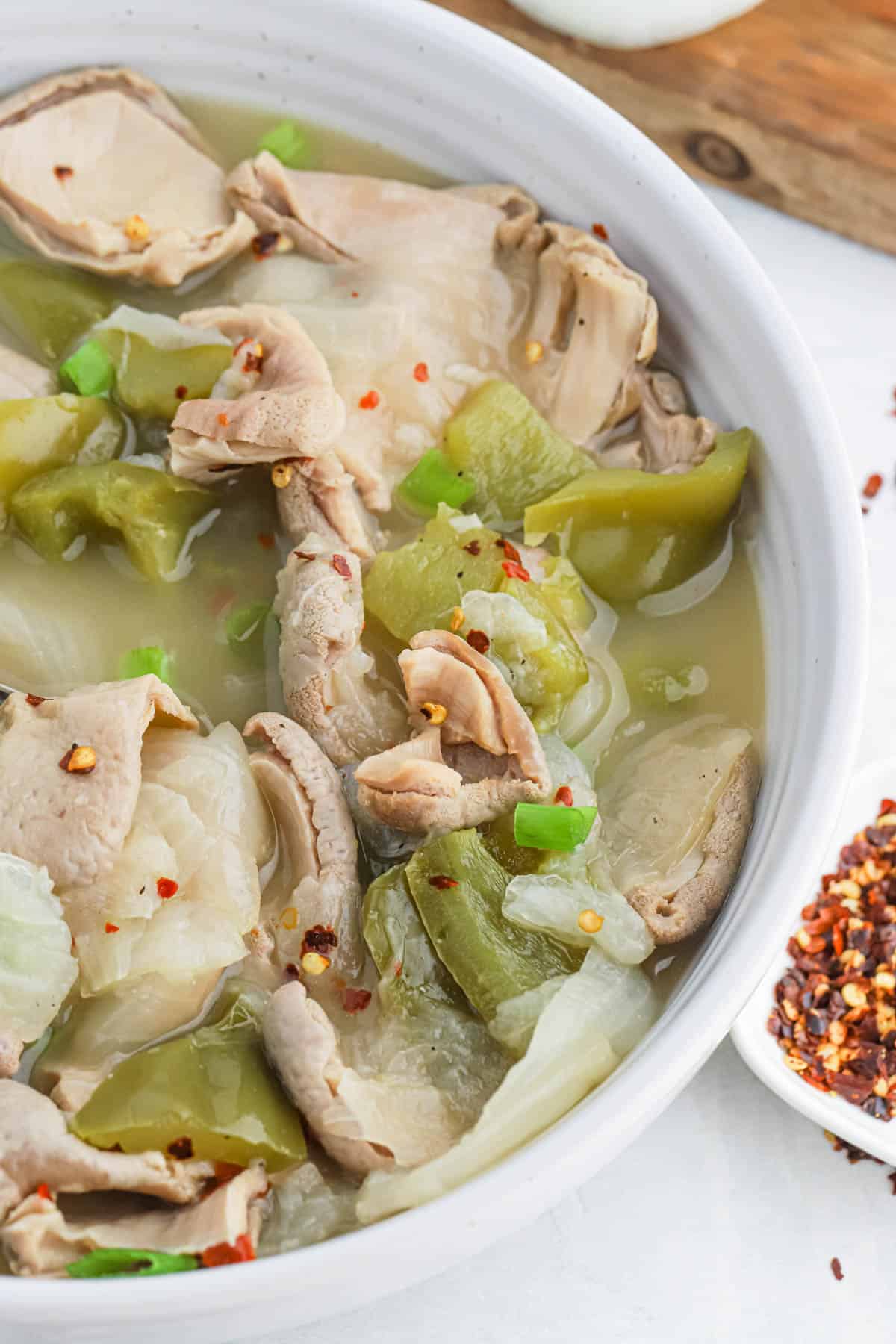
More Classic Southern recipes
- Southern Green Beans Recipe
- Fried Green Tomatoes Recipe
- Southern Potato Salad
- Old-Fashioned Southern Peach Cobbler
- 26 Southern Comfort Food Recipes
*Did you make this recipe? Please give it a star rating and leave comments below!* Post a photo of how your version of the recipe came out on Instagram (using #grandbabycakes)!!
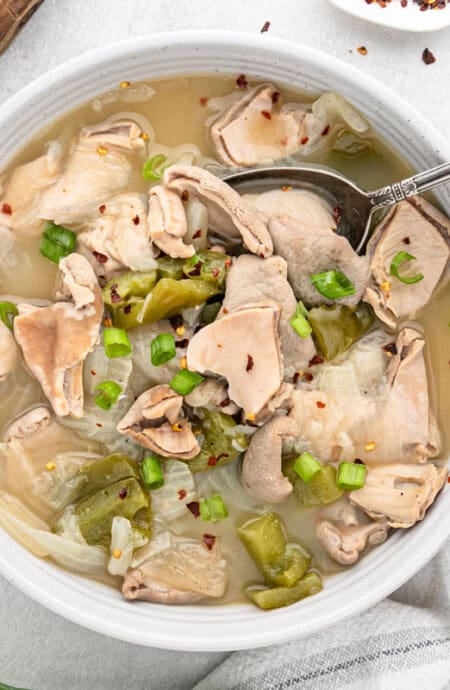
Hog Maws Recipe
Want to Save This Recipe, Boo?
Equipment
Ingredients
- 3-5 lbs hog maws thawed and cut into 1 inch pieces
- 1 small yellow onion chopped
- 1/2 green bell pepper chopped
- 1 1/2 tsp seasoned salt like a Lawry’s
- 1 tsp garlic powder
- 1/4 teaspoon black pepper
- 1/2-1 tsp crushed red pepper flakes optional
- 1 tsp apple cider vinegar optional
- Hot sauce for serving
Instructions
Cleaning the Hog Maws:
- Prepare a double sink or two separate wash sinks for the cleaning process.
- Ensure the sinks are thoroughly cleaned before adding the hog maws.
- Start by rinsing the hog maws one by one under room temperature water to remove any excess debris.
- Carefully inspect each chitterling and remove any visible grit or black substances then move to the other sink.
- Repeat the rinsing process 2 or 3 more times, ensuring they are clean and free from any impurities.
Cooking the Hog Maws:
- In a very large pot (we use a 5 gallon pot), fill it with 1/2-1 gallon of water then add quartered onion and green pepper along with salt, garlic powder and black pepper and red pepper flakes or apple cider vinegar if using, and turn to high heat and bring to a rapid boil.
- Once boiling, turn heat to medium and add the cleaned hog maws one at a time to the pot.
- Stir gently to distribute the seasonings evenly.
- Cover the pot and cook the hog maws over medium heat for about 2-3 hours, or until they are very tender and the flavor of the remaining liquid should be concentrated. Occasionally check the pot to check on them.
Serving the Hog Maws:
- Once the hog maws are cooked and tender, taste for flavor and adjust before removing from the heat.
- Serve the hog maws hot or even make them along with the chitterlings next time as a part of a larger meal. They are usually served with hot sauce so enjoy.
Notes
How to store & reheat
Let them cool to room temperature, transfer them to an airtight container, ensuring there’s a bit of broth or juices to keep them moist. Then, seal the container tightly to prevent any air from getting in. To reheat, pour them into a pot, cooking liquid and all, and warm them up over low heat. Stir occasionally to make sure they heat evenly. If they seem a bit dry, add some water. How long will Hog Maws last in the fridge?Your hog maws should last for about 3-4 days in the fridge when stored properly. Can I freeze them?
Yes, you can freeze them! Place them in a freezer-safe airtight container, again along with some of their cooking liquid for moisture. Label the container with the date, and they should keep well for up to 3 months. When you’re ready to defrost, it’s best to let them thaw overnight in the refrigerator before reheating.
Nutrition
Want to Save This Recipe, Boo?
This looks amazing and such a treat! Thank you!
Such a delicious meal! Thanks for this easy to follow recipe!
I remember hearing about how maws when I lived in the South, but never did get to try them out! Bookmarking this recipe so I finally can!
First time making this, and it came out fantastic! Thanks for such a great recipe!
I’ve definitely heard of hog maws, but never tried them- this looks delicious and I can’t wait to give it a try!
I stumbled on this site by accident, and I’m so glad I did. The recipes are amazing! Now I have to buy Jocelyn’s cookbook.
Aw, thank you so much, Wanda!